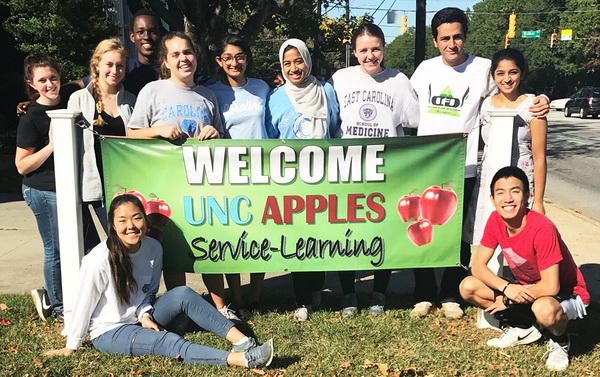By Becca Kronebusch
A record 82 Carolina students participated in APPLES Service-Learning Alternative Fall Break, providing direct and indirect service to communities across North Carolina and the southeast. The seven break trips focused on each community’s needs, including Latinx, urban, rural and refugee communities; environmental issues; hunger and homelessness; and Arts in Public Service.

The refugee community break to Greensboro, North Carolina is the newest addition to the APPLES alternative break program made possible through the Murdock Family Alternative Break Experience Fund. Since October 2016, North Carolina resettled 1,812 refugees, the ninth most in the U.S. Victor Arahirwa, a junior chemistry major from Santo Domingo, Dominican Republic, served as a refugee community break leader because he has family and close friends who have been refugees or asylum-seekers. He wanted to learn more about the resources available for refugees to integrate into the society they find themselves in.
“Refugees have been the victims of negative, dehumanizing portrayals in the media,” Arahirwa said. “This trip served to re-humanize refugees and show that if given the chance, they can make positive contributions to society, rather than being a burden. In the light of political measures to tighten border control in the U.S. and other countries, having a trip that raises awareness of the realities of being a refugee could not have come at a better time.”
The refugee alternative break experience included volunteer efforts at a community garden with World Relief High Point, educational programs around refugee resettlement, financial security, employment and health care with various partners.
Simran Khadka, a senior environmental health sciences major from Nepal and alternative fall break co-chair, helped establish the refugee trip to help Greensboro’s 11 refugee communities. She said that her mother’s volunteer work inspired her to create the trip.
“My mom used to volunteer with AmeriCorps’ ACCESS project in Greensboro, which helped refugees and immigrants gain access to many services, English for Speakers of Other Languages (ESOL) classes and life skills,” Khadka said. “I was definitely inspired by her even though she was ESOL individual herself. Even though her service was in 2010-2011, I was curious to know how the refugee demographics have changed over time.”
Khadka researched Greensboro community partners connected to refugee rehabilitation and created a mock trip report which turned into the plan for the new alternative fall break experience in Greensboro.
Students directly addressed the refugee community’s needs by installing water pipes in a community garden that grows local produce and providing after-school tutoring in math and English to refugee children.
Participants also gained a deeper understanding of resources and organizations available to immigrants. They attended a session at the North Carolina African Services Coalition, which assists refugees in finding employment, housing and language support, with the goal of helping them become self-sufficient within 90 days of arrival. In addition, students also talked with Dr. Jeff Walden of the Cone Health Family Medicine Center, who opened a clinic in 2014 to treat refugee patients, and they toured the FaithAction International House, which creates an environment of mutual understanding between immigrants, community members and law enforcement.
APPLES offers alternative breaks during fall, winter and spring breaks. To learn more, visit APPLES Alternative Breaks.
